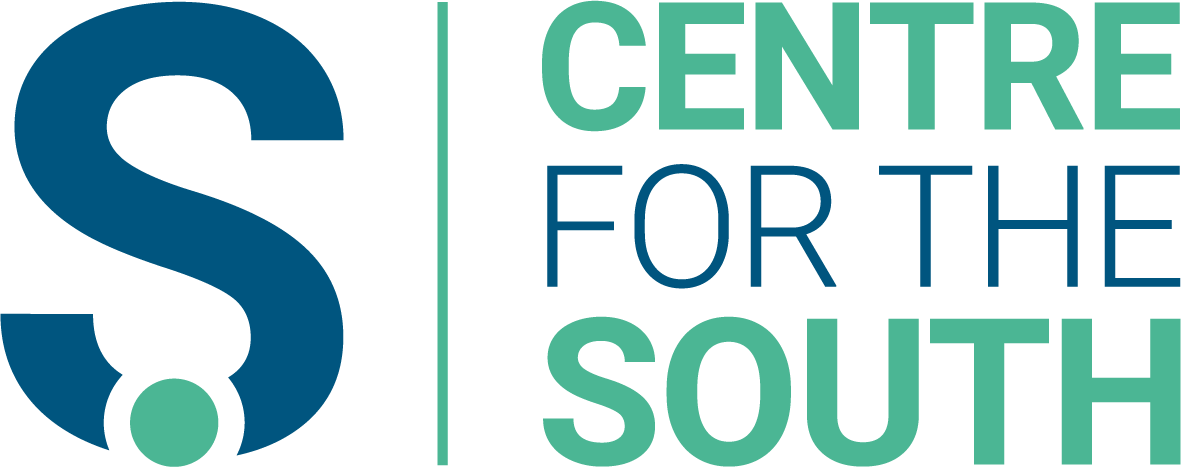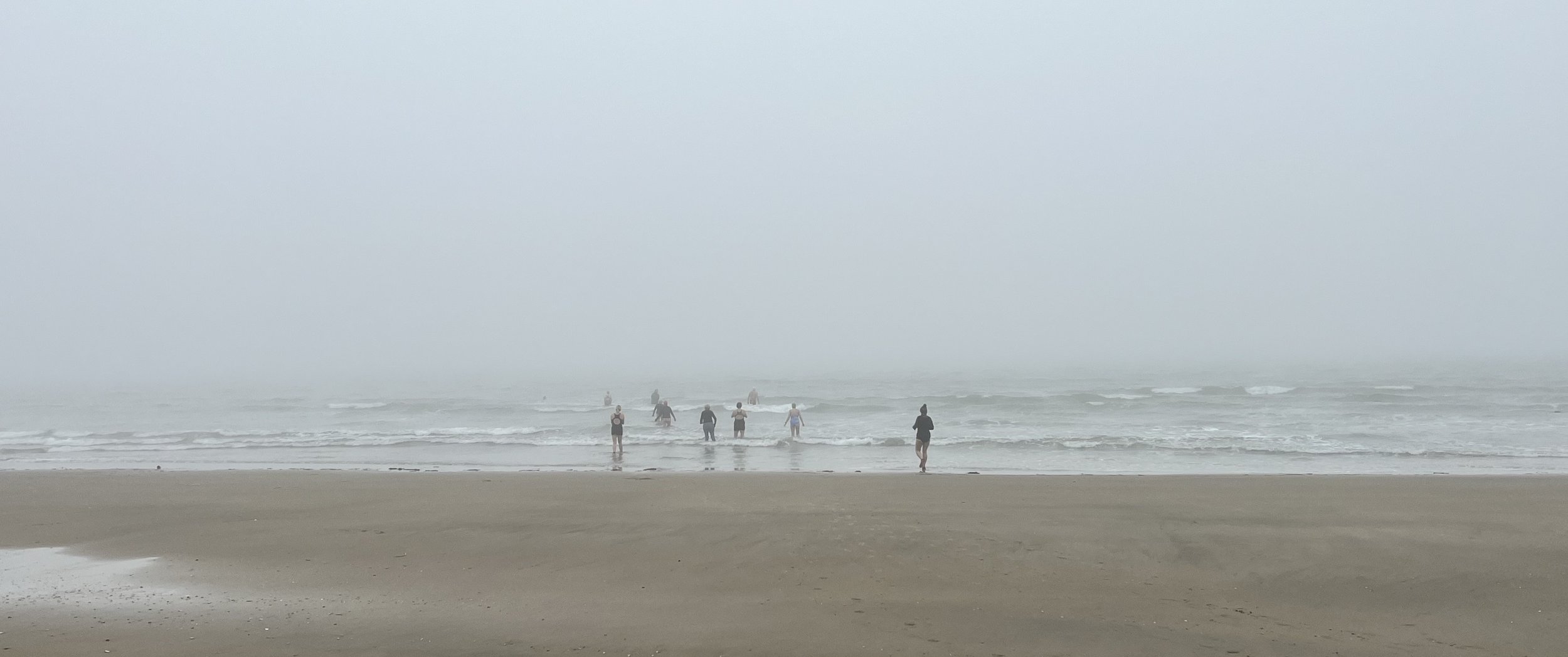BY SEA SWIMMERS, FOR SEA SWIMMERS
“By sea swimmers, for sea swimmers”: More Accessible, Beneficial and Safer Sea Swimming on the Isle of Wight
by Fiona Middleton and Giulia Champion
A dip with Swim the Wight at Yaverland in January 2024 to mark the start of the project.
From May to September each year, water quality testing occurs at designated bathing sites around England’s coast. But outside the official ‘bathing season’ cooler waters await sea swimmers, including the Swim the Wight group, whom we visited on 29th January 2024 for a frosty dip in Yaverland Bay, on the Isle of Wight. While the swimmers are all too aware of the recent press around water pollution and sewage outflows – and do their own regular testing to guarantee swimmable waters – the clear benefits of regular dips around the Island keep them heading into the waters all year round. Mentally, physically and socially, the positive impacts of sea swimming on the lives of frequent swimmers are backed up by research – and reflected in the 2023 Isle of Wight Sea Swimming Survey (see some key figures in the infographic below). However, despite the potential for sea swimming to play a part in health, wellbeing, social- and nature-connectedness among the Island’s swimmers, concerns over pollution, safety, facilities and accessibility keep people out of the water. As the Isle of Wight Sea Pool group unroll their campaign to build an accessible, eco-friendly tidal sea pool, a deeper understanding of these positives and concerns is called for.
Our project, entitled “Coastal (In)Securities: Swimming Safely through Blue Heritage on the Isle of Wight” and funded the Centre for the South New Things Fund, aimed to explore these benefits and barriers, support Swim the Wight’s work and engage with policy makers, local stakeholders and swimmers to think of solutions to these issues.
The team was composed of four researchers based at the University of Southampton: Fiona Middleton (School of Ocean and Earth Science), Dr Giulia Champion (Faculty of Arts and Humanities), Dr Franklin Nobrega (School of Biological Sciences) and Professor Jo Slater-Jeffries (National Biofilms Innovation Centre), with data analysis supported by Karel Jansen. The project allowed us to lay the groundwork for a policy brief asking:
“How can policy support safe, accessible, beneficial sea swimming and lower barriers for new and existing swimmers on the Isle of Wight? The overall aim of the project was to explore these benefits and barriers of sea swimming on the Isle of Wight, and to make recommendations to the local authority on how to encourage more (safer, more accessible) sea swimming.”
The project was built on work Fiona Middleton had begun with Swim the Wight in 2023, co-designing the online Isle of Wight Sea Swimming survey to gather baseline data on the sea swimming scene around the Island. The resulting report, available below, forms the groundwork for this project.
Motivated by the issues and opportunities identified through the survey, funding from the Centre for the South allowed the researchers to organise one online and one offline workshop for swimmers and local professionals in health and wellbeing, safety, regeneration, business and communities. The in-person workshop, held at the UK Sailing Academy (UKSA) in Cowes on the Isle of Wight, took survey results and an update on the Sea Pool project as food for discussion among groups of participants cycling between four topics:
(1) health and wellbeing,
(2) safe access to clean water,
(3) youth opportunities, and
(4) community, place and identity.
Participants were asked to discuss what was working well, what had potential, and what was not working well from their professional and personal perspectives. These topics were loosely revisited during the online workshop to bring together a collection of comments and suggestions.
From its inception, this project was co-created with Swim the Wight and with the Isle of Wight local and swimming communities in mind. We aimed particularly to make this project holistic and collaborative in its approach and objectives. For this reason, our approach included working across the humanities and marine social sciences. We used mixed methodologies, including survey data analysis and community-based participatory research to hear from local communities what was needed to affect change, and co-production practices to design and deliver the survey. By prioritising the local community and grounding our work in place-based approaches, we aimed to create a collaboration that will continue beyond this project and produce useful outputs – namely the policy brief and supporting the creation of a website hosting information about the Sea Pool.
Despite its local focus, this project also has a national scope given the sewage outflows around the UK’s coastline; many NGOs and groups have been working toward addressing this unacceptable situation, including Surfers Against Sewage, and while the government recognise the need for solutions, more needs to be done and more urgently. We thus aim for our research and policy brief to join this important national effort.
Read the new policy brief
You can also find out more about this project by listening to our Policy Pod episode.
Read about the campaign for a Sea Pool on the Isle of Wight on their website and on Instagram @isleofwightseapool.
Follow the amazing work done by Swim the Wight CIC on their website and on Instagram @swimthewight.
Left to right: Sue Barker, Swim the Wight; researchers Dr Giulia Champion and Fiona Middleton, University of Southampton; Victoria Thorneton-Field, Swim the Wight
Workshop participants and contributors
Franklin Nobrega, University of Southampton
Sue Barker, Swim the Wight
Victoria Thorneton-Field, Swim the Wight
Nela Nikolic, University of Southampton
Laura Cansdale, Isle of Wight Council
Julia Hutchinson, UKSA
Sarah Glaccum, University of Southampton
Lora Peacey Wilcox, Isle of Wight Council
Jon Dennington, sea swimmer
Mairin Williams, Surfers Against Sewage representative
Dr. Heather Massey, University of Portsmouth
Matthew Martin, Swim England
Patrick Yates, Dip n Sip Swimming Society
Susie Venables, Swim the Wight
Fiona Platt, Swim the Wight
Stefanie Oliphant, Menopause Isle of Wight
Angela Atherley, IoW Sea Pool steering group
Claire Walker, Unlimited Isle, IoW Sea Pool steering group
Simon Walker, Unlimited Isle, IoW Sea Pool steering group
References
Bickman, L., and D. J. Rog. 2009. The SAGE Handbook of Applied Social Research Methods. 2nd ed. Los Angeles, London, New Delhi, Singapore, Washington DC: SAGE Publications, Inc.
CAPE (Capability in Academic Policy Engagement), and Co-Production Collective. 2022. ‘Co-Production in Regional Academic-Policy Engagement: Developing Optimal Conditions’. Toolkit. https://www.cape.ac.uk/2022/06/07/co-production-regional-policy-engagement/.
Cvitanovic, C., R. J. Shellock, D. B. Karcher, P. Tuohy, M. Mackay, E. I. van Putten, Marta Ballesteros, and M. Dickey-Collas. 2024. ‘Navigating the Stormy Seas of Building “Trust” as a Boundary Organisation Connecting Marine Science with Policy and Management’. Ocean & Coastal Management 248 (February):106952. https://doi.org/10.1016/j.ocecoaman.2023.106952.
Holmes-Henderson, A., and L. Sewell. 2024. ‘How Does Arts and Humanities Research Influence Public Policymaking?’ 23 October 2024. https://upen.ac.uk/resources/how-does-arts-and-humanities-research-influence-public-policymaking/.
Kay, K., and E. Wettermark. 2023. First Steps in Participatory Research: A Guide for Postgraduate and Early Career Researchers in Arts and Humanities. Sheffield: University of Sheffield.
MacKinnon, S. 2018. Practising Community-Based Participatory Research: Stories of Engagement, Empowerment, and Mobilization. Vancouver: Purich Books.
Overbury, K., B. W. Conroy, and E. Marks. 2023. ‘Swimming in Nature: A Scoping Review of the Mental Health and Wellbeing Benefits of Open Water Swimming’. Journal of Environmental Psychology 90 (September):102073. https://doi.org/10.1016/j.jenvp.2023.102073.
Strand, M. 2023. ‘Arts-Based Participatory Research for More Equitable Ocean Governance in South Africa’. PhD Thesis, Gqeberha, South Africa: Nelson Mandela University.
Strand, M., N. Rivers, and B. Snow. 2022. ‘Reimagining Ocean Stewardship: Arts-Based Methods to “Hear” and “See” Indigenous and Local Knowledge in Ocean Management’. Frontiers in Marine Science 9:886632.




